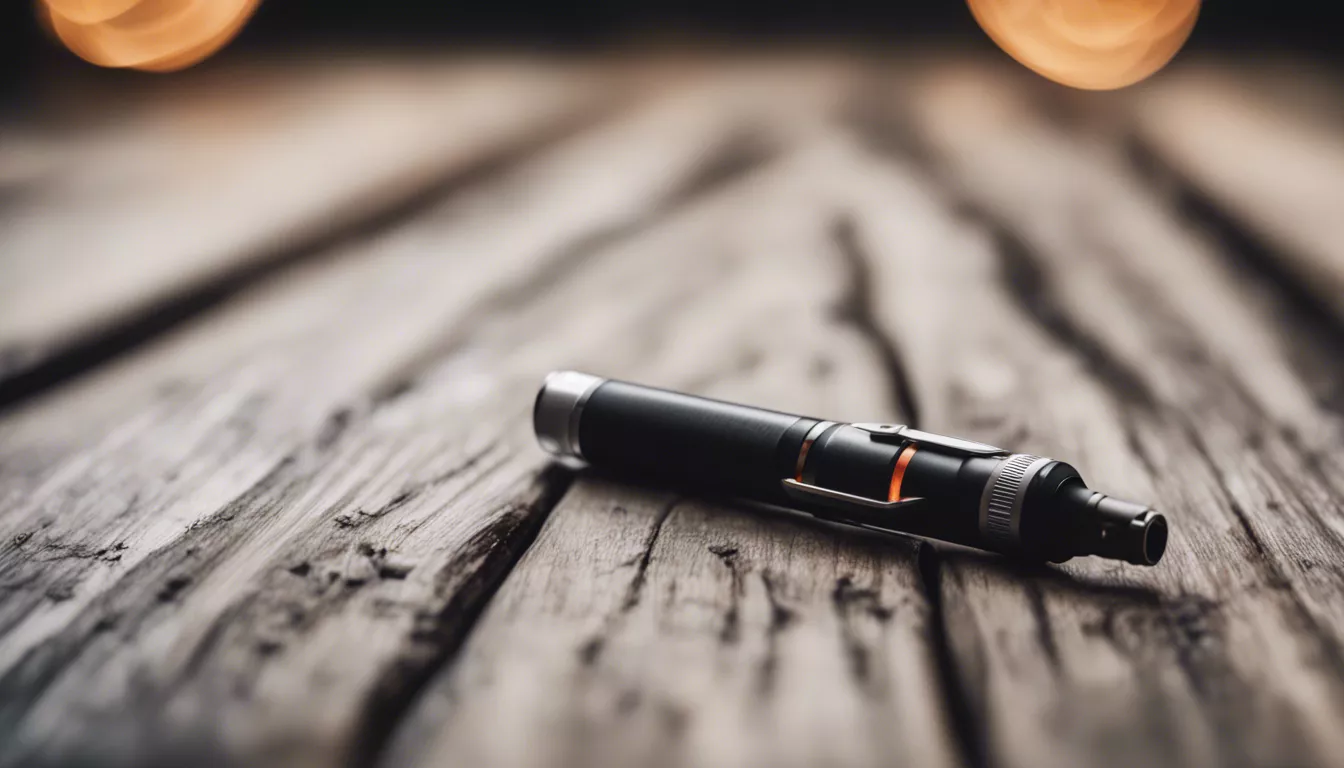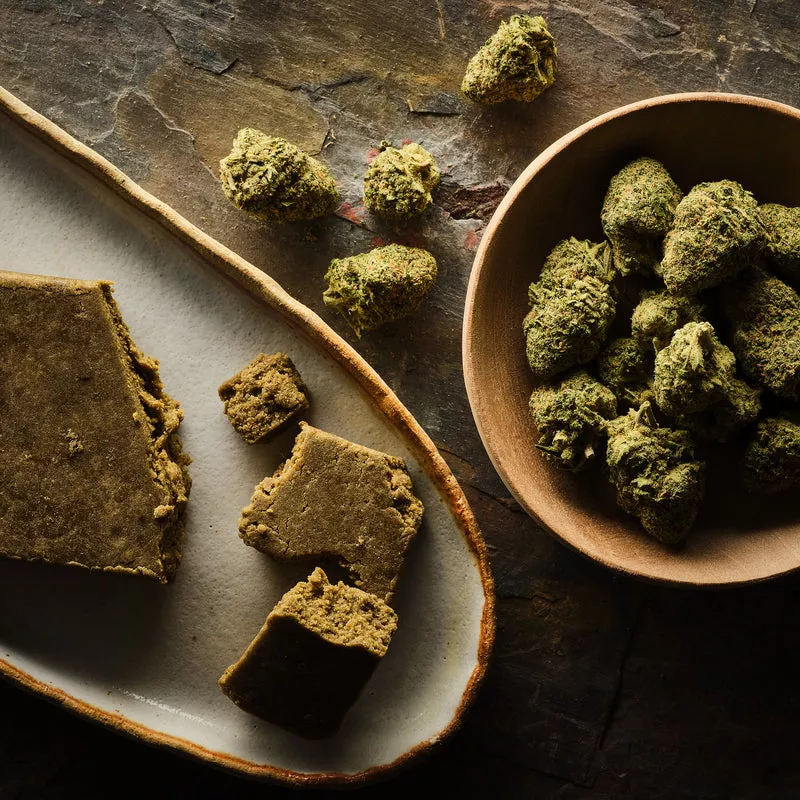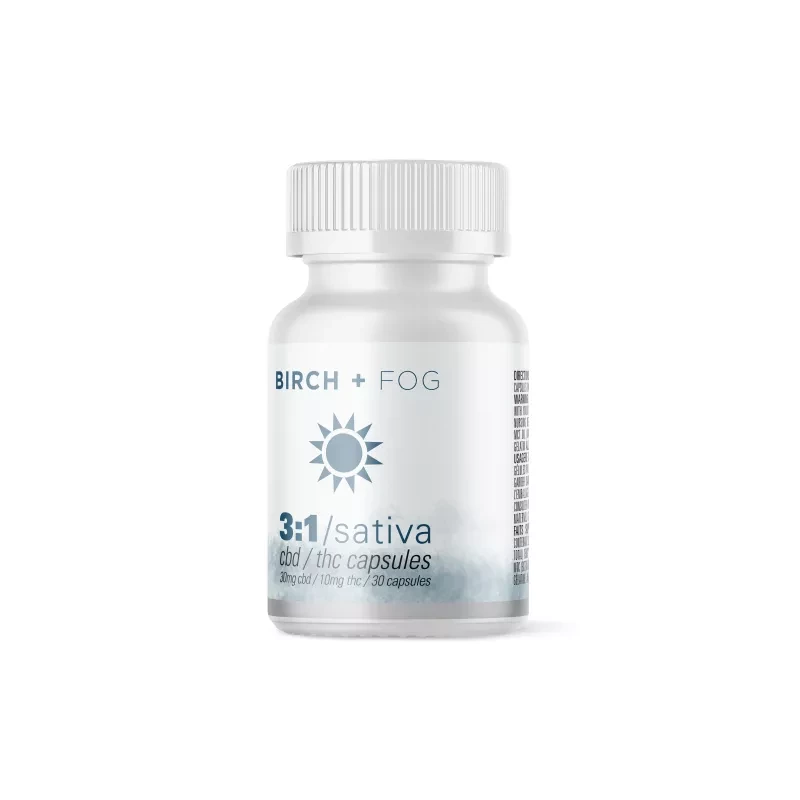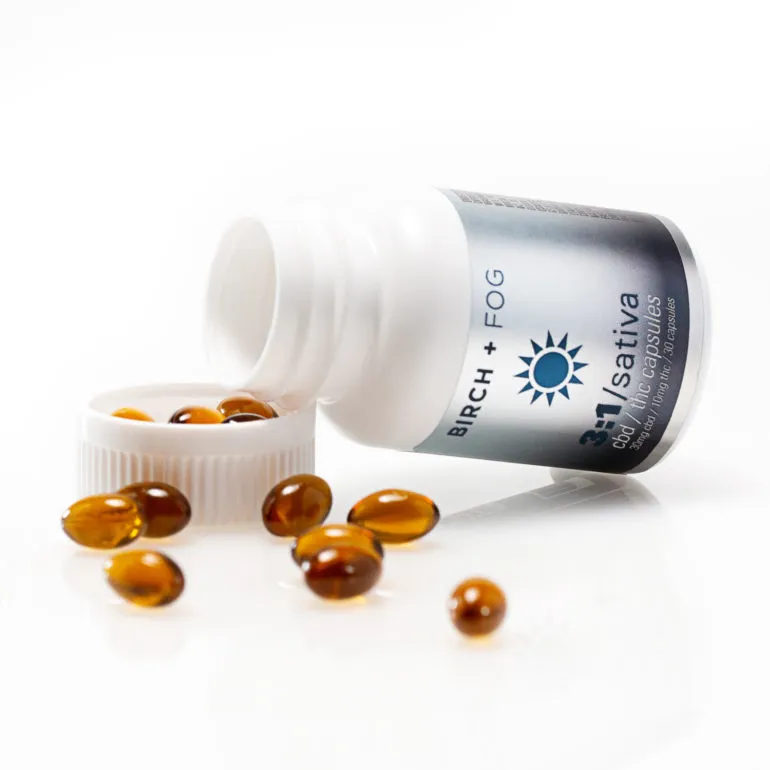- Shop All
- Type
- (144) THC>
- (75) CBD>
- Need
- Sleep>
- (21) Pain>
- (10) Anxiety>
- (6) Pets>
- (88) Edibles
- (14) CBD Edibles>
- (60) THC Edibles>
- (3) Ratio Edibles>
- (33) Hybrid Edibles>
- (87) Vegan>
- (5) Beverages>
- Strain
- (29) Indica>
- (24) Sativa>
- (47) Hybrid>
- (14) Tinctures
- (5) Anxiety Tinctures>
- (9) CBD Tincture>
- (1) Pain Tincture>
- (4) Ratio Tincture>
- (4) Sleep Tincture>
- (4) THC Tincture>
- (4) Capsules
- (1) CBD Capsules>
- (0) THC Capsules>
- (3) Ratio Capsules>
- Foggers
Best THC & CBD Capsules Guide - Everything You Need to Know in 2024
Olivia St JamesAugust 30, 2022LatestContents
Cannabis capsules are formulated as a natural treatment popularly containing CBD and THC oil, known to help treat issues like insomnia, chronic pain, anxiety, depression, and others.
CBD and THC capsules are a natural alternative to other CBD-THC forms due to their convenient size, portability, and dosing simplicity.
In our post “Capsules a beginners guide”, we provide the basics to help you understand the benefits of CBD and other cannabis capsules like Phoenix tears or Sativa, the difference, and how to shop for the best CBD and THC capsules.
What are CBD Capsules?
The body’s endocannabinoid system (ECS), allows for cannabinoids like CBD and THC, to be able to interact with the body and provide relief from pain, anxiety, depression, insomnia, and other ailments or disorders.
Because of all of these fantastic advantages, the CBD business has developed various delivery methods, including CBD capsules. We can say then that CBD capsules are an oral method of CBD administration composed of a gel that combines CBD oil plus a carrier oil like MCT oil for enhanced absorption owing to CBD's lipophilic nature.
In addition, CBD is a cannabinoid found in abundance in hemp plants and, to a lesser extent, marijuana plants. Additionally, elements such as terpenes and flavonoids are found during the CBD extraction process, resulting in three types of CBD oil.
CBD Types
CBD capsules are commonly sold in three varieties: Full Spectrum, Broad Spectrum, and CBD Isolate. The characteristics of each type are as follows:
- Full Spectrum CBD capsules include all of the beneficial cannabinoids and terpenes, as well as a trace of THC. Very helpful for anyone wishing to benefit from the hemp plant's all-natural components.
- Broad Spectrum CBD Capsules main characteristic is that THC is not present. Broad Spectrum CBD is ideal for those who are sensitive to THC yet want to get the benefits of all cannabinoids, flavonoids, and terpenes.
- CBD Isolate capsules offer only CBD oil, it has gone through a process where all other compounds of the hemp plant have been removed, meaning there is no THC, no other cannabinoids, and no terpenes.
Furthermore, is common for CBD brands to provide a combination of just CBD and THC, known as “ratio capsules”, this mix of CBD and THC usually contains a higher amount of CBD than THC.
When larger levels of THC are present in the formula, these capsules are popularly referred to as medicinal cannabis capsules.
What exactly are Cannabis Capsules?
Cannabis capsules are known to have greater effects than just CBD capsules; the difference is due to the plant from which the oil is extracted.
CBD is plentiful in hemp, but what is usually known as the cannabis plant (marijuana) has less CBD and a larger level of THC.
Similar to CBD, full spectrum THC oil is available, where a method of extraction makes Cannabis oil purer and highly effective.
Pure cannabis oil is known as Full Extract Cannabis Oil (FECO) and Phoenix Tears RSO (Rick Simpson Oil), both are considered the same type of oils, both have a high THC content and thick, black appearance, and they are commonly marketed in syringes, but may also be obtained in capsule form. Some may claim that they differ owing to the solvent employed in their extractions.
It is important to note that Phoenix Tears and FECO have all phytochemicals, including CBD, have psychoactive effects, and prone to other side effects like low blood pressure. bloodshot eyes, dizziness, and more.
Another popular medicinal cannabis alternative is Sativa capsules. Sativa is a kind of marijuana plant whose oil is known to provide an energy boost. There are also Cannabis capsules manufactured using Indica oil, another type of marijuana plant whose oil has sedative properties.
Overall medicinal cannabis is aim to help with strong health conditions like chronic pain, depression, and autoimmune-related disorders, cancer treatment side effects, certain types of cancer, or any condition that requires a higher dose of THC, while also benefiting from CBD.
Dosing Guide
One key feature of CBD and Cannabis capsules is that they last roughly as long as a pain medication, from 6 to 8 hrs. In addition, capsules are just easy to swallow and contain pre-measure cannabis oil.
However, when it comes to dosing with CBD capsules or Cannabis capsules, you may be wondering which dosage is best for you.
To begin, you should be aware that CBD oil and Cannabis capsules are available in a number of potencies, such as 5 mg, 25 mg, and 50 mg per capsule, and many brands include a total of 30 capsules, to facilitate your intake up to a month if you decide to begin with one capsule per day.
There is no standard dosage, for either CBD or THC, the reality is there are factors like weight, metabolism, and most importantly the health issue you want to target that influence the effects of CBD and Cannabis.
Furthermore, because each condition affects each individual differently, even if you have the same problem as another person, your dosage will be different. As a result, its best to choose a low potency capsule and decide how many capsules each day you will take as a safe approach, to begin with.
Tolerance is also essential when determining the number of capsules you will take during the day, for it is well known that to get to your right dose the process is gradual, and it is best to keep note of your intake and its effects, and gradually increase it.
Some individuals prefer to begin with 2 low dosage capsules per day, to determine its effects in the morning and the late afternoon.
Another aspect of Capsules is the time they take to have in effect, around 40 to 2 hours, consider this when beginning your dosage, and especially if you choose medicinal cannabis, plan and understand its possible side effects (psychoactive).
Our Top CBD and THC Capsules
The finest capsules are those that are tailored to your specific needs and lifestyle, which is why you can find a number of solutions in Birch and Fog online store, each product with content descriptions, varying potencies, and ratios, all align for treating symptoms at any time of day.
Our top CBD and Cannabis capsules are great for those seeking accurate and consistent dosage and looking to approach their conditions more naturally.
1 Birch + Fog | CBD: THC Capsules 3:1 Ratio Day Time
When you wish to alleviate discomfort during day time without experiencing a "high," these ratio capsules are a great choice, helping ease symptoms of anxiety, depression, and general pain.
Birch + Fog our signature brand formulates these capsules with three times as much CBD as THC, making them excellent for THC-tolerant individuals. In addition, it's great packaging (child proof) contains 30 capsules with 30 mg CBD and 10 mg THC each.
Birch & Fog routinely tests the potency and quality of its products to provide our customers with the best possible experience.2 Birch + Fog | ENERGIZE CBD Capsules
A consistent dose is key when treating any type of condition and supplying that extra energy your body needs.
Birch + Fog “energize” capsules contain CBD full spectrum oil, 25 mg strength per capsule, and a total of 30 capsules, with accurate dosing, and spill-proof packaging, making it excellent for portability.
CBD helps you increase focus and productivity more naturally, so for both new and experienced users, CBD capsules have become a top choice when looking to provide that daily boost.
3 Now + Then| Phoenix Tears Capsules
Experience full-body relief with Phoenix tears in capsules by Now + Then, compared to the well-known oil syringes, these are more practical and simpler to dose.
Phoenix tears oil in a capsule is a potent and concentrated medicinal cannabis oil, famously known to combat certain types of cancer, side effects, and more. Effective for long-term, severe chronic pain, that is known to generate weakness over time.
With convenient packaging, each bottle provides 30 capsules and options of 5 mg, 10, 25, and 50 mg per capsule to choose from, making your transition or finding your right dose much easier.
Final Thoughts...
In the form of capsules, CBD and THC oil can provide comprehensive relief to many health-related issues like anxiety, depression, and chronic pain, but remember patience is essential, for they might not work as fast as you would like.
Is recommended to stay for about a week with a consistent dosage, and gradually increase after this period.
Furthermore, owing to their purity and strength, medicinal cannabis capsules such as phoenix tears are more likely to create side effects (high), but with the added benefit of delivering treatment for serious or long-term conditions.
Overall, CBD, THC, and medical cannabis capsules are fantastic choices if you don't want or can't smoke, want to avoid the calories in CBD gummies or chocolate, or don't wish to taste anything earthy ( a common flavor found in tinctures).
Finally, but certainly not least, it's critical to talk to your doctor about cannabis as an alternative medication, especially if you're on a prescription. And although many cannabis users claim satisfaction in relieving symptoms, keep in mind that everyone is unique.
0/5 (0 Reviews)Latestfrom B+FBe the first to know about exciting new products, special events, seasonal offers, and much moreOur Collective
Wellness to your doorstepCopyright © 2024 All Rights Reserved | BIRCH + FOG[gtranslate]Save your cart?
x












